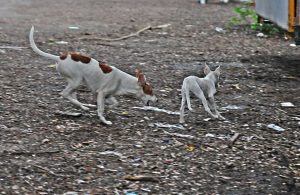Officials cited practical difficulties in vaccinating the state's estimated 2.8 lakh stray dogs. Target achieved in drive: 6,218.

Kerala's month-long drive to vaccinate an estimated 2.8 lakh stray dogs has been a major failure. (KB Jayachandran/South First)
The Kerala government’s much-vaunted month-long programme to vaccinate stray dogs that kicked off on 20 September seems to have failed miserably.
The reason, it seems, is that the canines refused to get pinned down to be vaccinated.
“Catching stray dogs is not easy,” says Dr Sindhu K, additional director at the state’s Animal Husbandry Department, which had been tasked with the job.
“These dogs are brilliant,” she told South First. “They run away when they hear our vehicles approaching.”
It is a practical difficulty that officials at the Animal Husbandry Department had not bargained for.
As a result, their data shows, only 6,218 strays could be vaccinated till 18 October by an 843-man team of dog catchers, against the estimated 2.8 lakh canines roaming the streets of Kerala.
Interestingly, the number of pet dogs vaccinated in Kerala during the same period: More than 2.8 lakh.

The there have been nearly two lakh dog bite cases in the state this year. (KB Jayachandran/South First)
Catching and vaccinating 2.8 lakh strays in 30 days works out to 9,333 cases a day; with 843 people on the job, it means at least 11 dogs per person daily.
Dr Sindhu admits it is difficult to gauge how long it would take to vaccinate all the strays given the many practical difficulties.
“Some days we vaccinated two or three dogs, some days it was 10, and then there were days we did not manage to vaccinate a single one,” she said.
Can oral vaccines be a solution? It is an avenue that is not closed, Dr Sindhu said.
“If this situation continues, we may have to use that option.”
While the Animal Husbandry Department was tasked with the vaccination drive, it outsourced the dog-catching to several voluntary organisations.
And the mobilisation of dog-catchers was handed over to the State Poverty Eradication Mission (SPEM), popularly known as Kudumbashree Mission.
Ratheesh, who works with the Kudumbashree Mission, told the South First that on September 27 — a full week after the vaccination drive was to kick off — a list of 843 people willing to volunteer as dog catchers were given by Kudumbashree to the department.
The current drive was announced by Minister for Local Self-government and Excise KB Rajesh a little over a week after a 12-year-old girl died of dog bite wounds at a Kottayam hospital on 2 September, despite having received the government-approved rabies vaccine.
According to an expert committee led by former Kerala High Court Judge S Siri Jagan, which submitted its report to the Supreme Court in September, in 2022 alone there were 21 rabies deaths and 1.96 lakh dog bite cases in the state.
Spurred into action by the outcry over the girl’s death, and all-round disquiet over the state’s dog bite problem, the Kerala government last month filed a plea in Supreme Court seeking culling of stray canines.
The court turned down the petition on 12 October, and ruled that policy-related matters on the issue would be heard in February.
It also transferred the individual cases related to stray dog bites to the Kerala High Court.
The state government’s petition enraged animal lovers in Kerala and other parts of the country, forcing Chief Minister Pinarayi Vijayan to declare on 16 September that no stray dog would be killed, and that other methods would be used to deal with the issue.
But if his government was hoping vaccinating strays would solve the problem, clearly that has not proved successful so far.
South First’s calls to Minister MB Rajesh, Additional Secretary Sarada Muraleedharan went unanswered.
In early September, at the outset of growing rabies deaths despite vaccination in the state, Kerala Health Minister Veena George stated in a Facebook post that she has written to Union Health Minister Mansukh Mandaviya “seeking a directive” to re-examine the quality of the anti-rabies vaccine.
Later, a three-member central panel visited Kerala to study the rabies deaths in the state concluded they were not due to ineffective vaccines.
According to a report in Indian Express the committee flagged various issues like “the availability of anti-rabies vaccine and serum, knowledge gaps in essential wound washing after animal bite, and health workers not knowing when to administer rabies immunoglobulin”.
Noted pathologist KP Aravindhan said there was nothing wrong with the anti-rabies vaccines.
“We have already stated that the rabies deaths are not due to the lack of efficacy of the vaccines,” Aravindhan told South First.
On the vaccination campaign announced by the state, Aravindhan said: “I suspect that vaccinating such big number of stray dogs within a short duration was an unrealistic target.”
He said that without reducing the number of stray dogs it will be difficult to find a short-term solution to the crisis.
“The government may need to get permission for processes like euthanasia for certain dogs. What the government should do is convince the courts that many of the decisions by the court are not practical.”

Jul 26, 2024

Jul 26, 2024

Jul 25, 2024

Jul 25, 2024

Jul 25, 2024

Jul 24, 2024